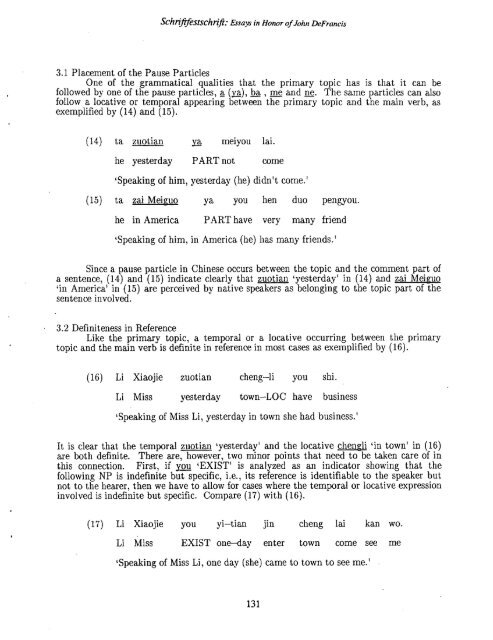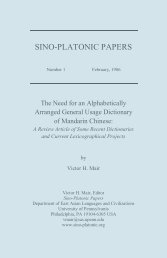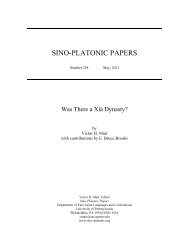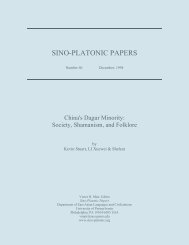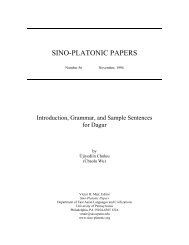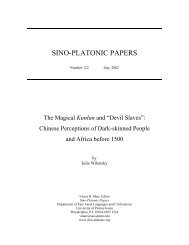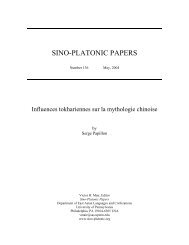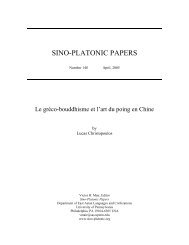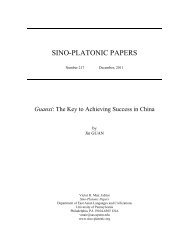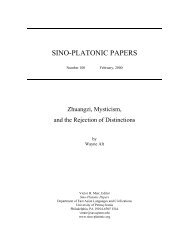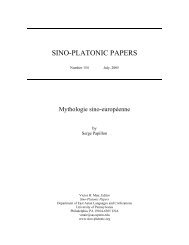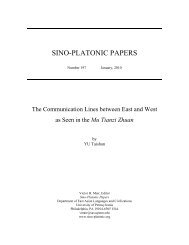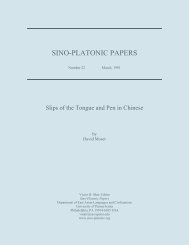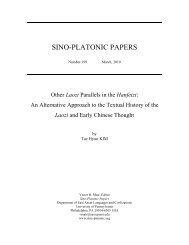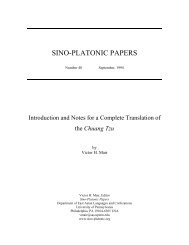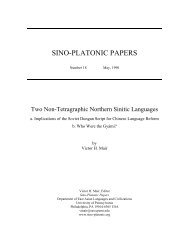Essays on Writing and Language in Honor - Sino-Platonic Papers
Essays on Writing and Language in Honor - Sino-Platonic Papers
Essays on Writing and Language in Honor - Sino-Platonic Papers
You also want an ePaper? Increase the reach of your titles
YUMPU automatically turns print PDFs into web optimized ePapers that Google loves.
Schnffestschhnfr: &says <strong>in</strong> H<strong>on</strong>or of John DeFrancis<br />
3.1 Placement of the Pause Particles<br />
One of the grammatical qualities that the primary topic has is that it can be<br />
followed by <strong>on</strong>e of the pause particles, a (s), & , me <strong>and</strong> E. The same particles can also<br />
follow a locative or temporal appear<strong>in</strong>g between the primary topic <strong>and</strong> the ma<strong>in</strong> verb, as<br />
exemplified by (14) <strong>and</strong> (15).<br />
(14) ta zuotian meiyou lai.<br />
he yesterday PARTnot come<br />
'Speak<strong>in</strong>g of him, yesterday (he) didn't come. '<br />
(15) ta zai Meiguo ya you hen duo pengyou.<br />
he <strong>in</strong> America PART have very many friend<br />
'Speak<strong>in</strong>g of him, <strong>in</strong> America (he) has many friends.'<br />
S<strong>in</strong>ce a ause particle <strong>in</strong> Ch<strong>in</strong>ese occurs between the topic <strong>and</strong> the comment part of<br />
a sentence, (147 <strong>and</strong> (15) <strong>in</strong>dicate clearly that zuotian Lyesterdayl <strong>in</strong> (14) <strong>and</strong> zai Meiguo<br />
'<strong>in</strong> America' <strong>in</strong> (15) are perceived by native speakers as bel<strong>on</strong>g<strong>in</strong>g to the topic part of the<br />
sentence <strong>in</strong>volved.<br />
3.2 Def<strong>in</strong>iteness <strong>in</strong> Reference<br />
Like the primary topic, a temporal or a locative occurr<strong>in</strong>g between the primary<br />
topic <strong>and</strong> the ma<strong>in</strong> verb is def<strong>in</strong>ite <strong>in</strong> reference <strong>in</strong> most cases as exemplified by (16).<br />
(16) Li Xiaojie zuotian cheng-li you shi.<br />
Li Miss yesterday town-LOC have bus<strong>in</strong>ess<br />
'Speak<strong>in</strong>g of Miss Li, yesterday <strong>in</strong> town she had bus<strong>in</strong>ess.'<br />
It is clear that the temporal zuotian 'yesterday' <strong>and</strong> the locative chengli '<strong>in</strong> town' <strong>in</strong> (16)<br />
are both def<strong>in</strong>ite. There are, however, two m<strong>in</strong>or po<strong>in</strong>ts that need to be taken care of <strong>in</strong><br />
this c<strong>on</strong>necti<strong>on</strong>. First, if you 'EXIST' is analyzed as an <strong>in</strong>dicator show<strong>in</strong>g that the<br />
follow<strong>in</strong>g NP is <strong>in</strong>def<strong>in</strong>ite but specific, i.e., its reference is identifiable to the speaker but<br />
not to the hearer, then we have to allow for cases where the temporal or locative expressi<strong>on</strong><br />
<strong>in</strong>volved is <strong>in</strong>def<strong>in</strong>ite but specific. Compare (17) with (16).<br />
(17) Li Xiaojie you yi-tian j<strong>in</strong> cheng lai kan wo.<br />
Li Miss EXIST <strong>on</strong>e-day enter town come see me<br />
'Speak<strong>in</strong>g of Miss Li, <strong>on</strong>e day (she) came to town to see me.'<br />
131


